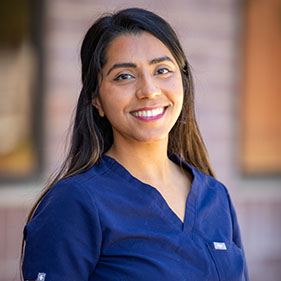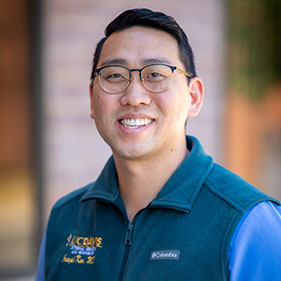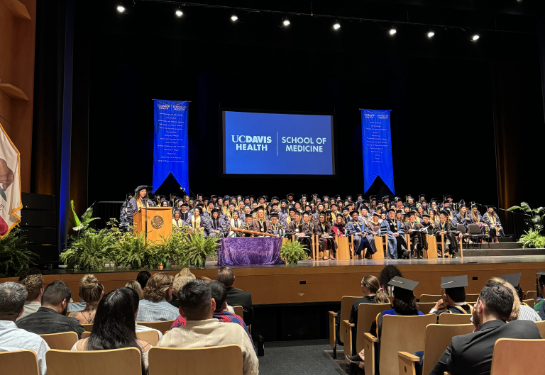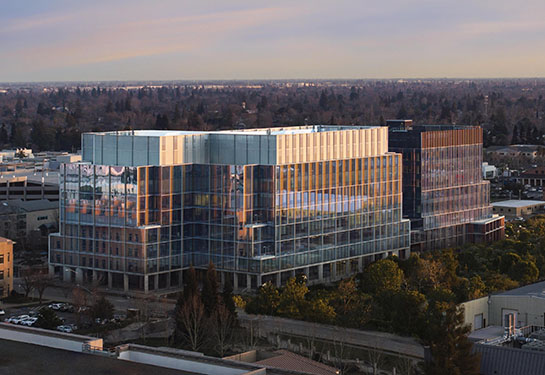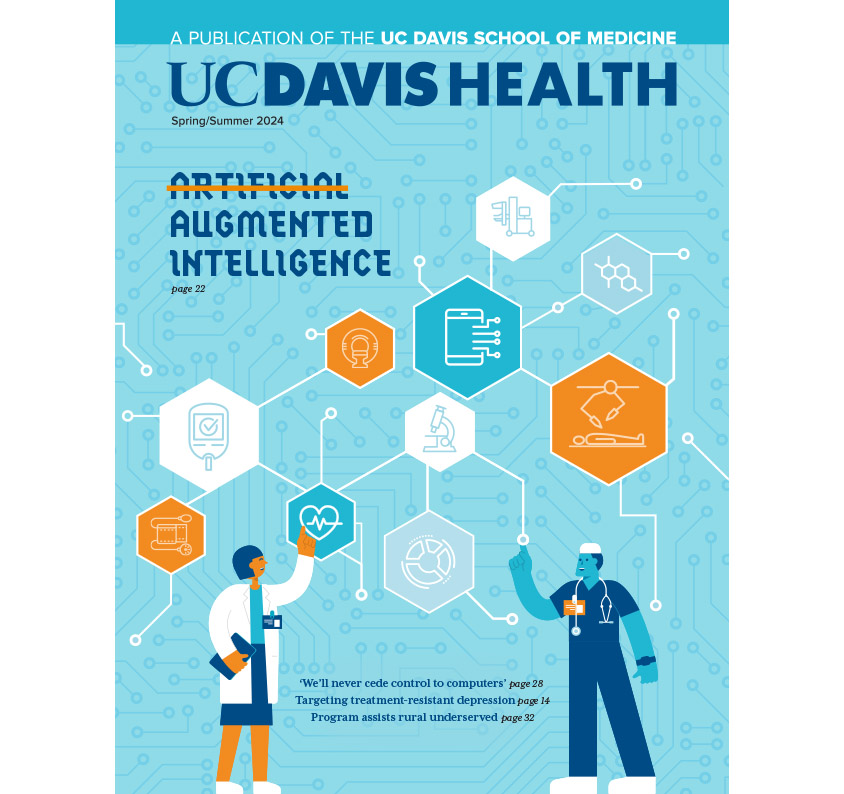Holistic care promotes health equity and improves outcomes
Patients at a community clinic stay healthy when UC Davis providers help resolve their non-medical problems
Joseph Kim wanted more than anything to help his low-income patients get healthy and avoid the emergency department for their primary care needs.
But the UC Davis Health resident who trains at the Sacramento County Health Center quickly learned his limitations: There was relatively little he could do for many of his patients because their medical issues were intertwined with non-medical issues that he couldn’t fix.
Then he and his attending physician Kirti Malhotra found a solution.
Kim is specializing in internal medicine and psychiatry. Malhotra has vast experience with marginalized communities. Together, they created a novel approach to care that focuses on a patient’s physical, mental and social needs. The holistic approach is called Complex Care Management, or CCM. At its core is an interdisciplinary team of providers, including social workers, who tackle the greatest needs of vulnerable patients.
The initiative is making a difference.
A man with persistent skin problems from flea bites, for example, received a grant his providers helped secure to pay for a deep cleaning of his home. Diabetic patients who can’t get insulin in homeless shelters for lack of refrigerators are now receiving alternative medications that can be stored at room temperature, thanks to the center’s pharmacists.
“Being involved with this clinic has rejuvenated the idea of why I wanted to start a career in medicine,” Kim said. “At the root of all things, it’s to help people.”
But the CCM is not only helping patients at the center. It’s also freeing up space down the street in the busy UC Davis Medical Center emergency department, which is frequently used by health center patients.
The CCM started in earnest in Summer 2021. Within six months, emergency department visits by the center’s patients were cut in half, and hospitalizations dropped by 42% as their social needs were addressed, Kim said.
According to statistics kept by the federal Agency for Healthcare Research and Quality, the top 1% of a hospital’s “super utilizers” are responsible for a whopping 21% of all health care expenditures. At UC Davis Medical Center, Medi-Cal patients with unmet social needs rank high among that group.
Oftentimes, such patients with non-medical, non-psychiatric needs show up in emergency rooms, which is costly to hospitals and diverts staff from true emergencies.
As providers, our goal is to promote health equity and improve patient outcomes, and in the 21st Century, we can’t just address the disease by itself. We have to address the underlying causes.” —Kirti Malhotra, assistant clinical professor
The origin of Complex Care Management
Kim, a Sacramento native, UC Berkeley graduate and UC Davis School of Medicine alumni, has always had a big heart for vulnerable patients.
It’s no wonder that a highlight of his five-year residency program is the coveted assignment at the county health center at Stockton Boulevard and Broadway. The Federally Qualified Health Center is staffed by dozens of UC Davis residents and faculty.
The center and its personnel provide health care to a population that otherwise wouldn’t have any. Patients – native-born and immigrant – struggle with chronic conditions and complicated co-morbidities that require strict adherence to medications and treatment plans for successful outcomes.
When doctors are assigned there, it doesn’t take long to realize that no matter how much medical and psychiatric care they can offer, patients endure an endless struggle with social determinants of health – the economic and social conditions that contribute to poor health.
Malhotra, a primary care doctor and Kim’s attending physician, is an immigrant from a low-income background who found it rewarding when she first started to care for vulnerable patients a decade ago.
“I saw how our fragmented health care system often failed the most vulnerable among us,” she recalled. “My patients needed a lot more support than I was able to provide.”
She helped create the center’s Chronic Disease Management program, and leveraged her interest in addressing health care disparities to build what became the CCM team. The main goal of the effort is to improve healthcare delivery and reduce utilization of the emergency room for primary care.
So, when Kim approached Malhotra with his idea to add a social component to health care, she immediately saw the potential for collaboration.
“I had a vision of building an interdisciplinary Complex Care Management clinic that helped patients beyond the immediate medical illness, and it was very exciting to work with someone as exceptional as Kim,” she said.
Malhotra and Kim enlisted fellow internal medicine and psychiatry resident Luther Arms, then went into research mode. They learned about similar efforts at clinics across the country, and were eager to make it work in Sacramento for some of the 5,000 Medi-Cal beneficiaries connected to UC Davis Health through the center.

Partnership with the UC Davis Medical Center Emergency Department
The trio collaborated with the emergency department to request a weekly list of the county health center patients with chronic comorbidities such as hypertension, diabetes, heart failure, lung diseases and psychiatric illness, who had been in the hospital. They began a review of the charts and learned who had been readmitted or made repeat visits to the emergency department.
They tried a proactive approach by calling to check in on the patients shortly after they were discharged. The doctors wanted to identify and address reasons why the patients avoided the center for non-emergency, primary care treatment.
They also tapped Christine DeBelen-Wilson, a family nurse practitioner with extensive experience in care coordination who helped expand the clinic and now leads the CCM outreach team.
The team includes faculty physicians, another resident, a nurse practitioner, a social worker, RN case manager, nurse practitioner/physician assistant students, nursing students, medical students and clerical workers.
Each week, the team’s three residents – Kim, Arms and Matthew Adams – spend an hour with each new patient under the supervision of Malhotra to learn about their needs and develop a care plan to address their underlying issues. The interdisciplinary team creates a whole person care plan that addresses barriers to care. It also works closely with the Medi-Cal managed care plan representatives and UC Davis Health case management team led by ambulatory case manager Michele Koth, to address the barriers.
“Essentially, patients who have many risks in terms of social determinants of health or have multiple medical or mental health conditions, are given individualized attention to help them navigate a complex health care system, connect to social services, and establish a communication channel to coordinate care,” said Susmita Mishra, medical director of the Sacramento County Health Center, primary health division.
Being involved with this clinic has rejuvenated the idea of why I wanted to start a career in medicine. At the root of all things, it’s to help people.” —Joseph Kim, resident, internal medicine and psychiatry
Providing solution-oriented care to meet individual needs
When the CCM team met with a man who showed up in the emergency department almost weekly with asthma problems, they were surprised to learn why: The man wasn’t using his inhalers because he could not remember the name of each device and never understood the directions upon receiving his prescriptions.
The team placed colorful stickers on his inhalers so he can more easily identify them. This helped him stay out of the emergency department for months, Malhotra said.
Malhotra and Kim said they are grateful to be part of a team that is dedicated to reducing health disparities by creating a person-centered approach that can address the underlying social determinants of health.
Seven members of the team summarized their innovative approach to care on a poster which Kim and Malhotra recently presented at the Society of General Internal Medicine in Orlando.
One of Kim’s priorities in the coming days is to ensure the CCM stays on solid footing before his residency ends June 30 and he moves to a new job at a New York teaching hospital.
Malhotra, noting the success of the initiative, is confident in its future.
“As providers, our goal is to promote health equity and improve patient outcomes, and in the 21st Century, we can’t just address the disease by itself,” Malhotra said. “We have to address the underlying causes.”



